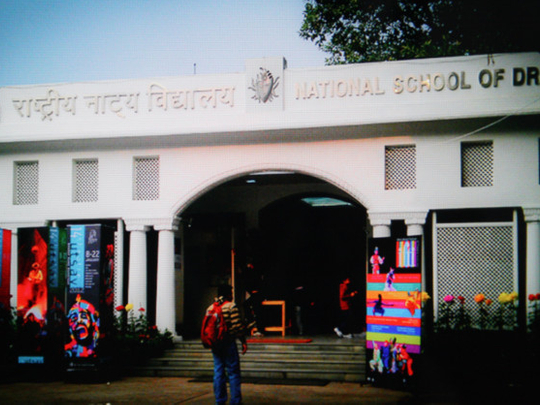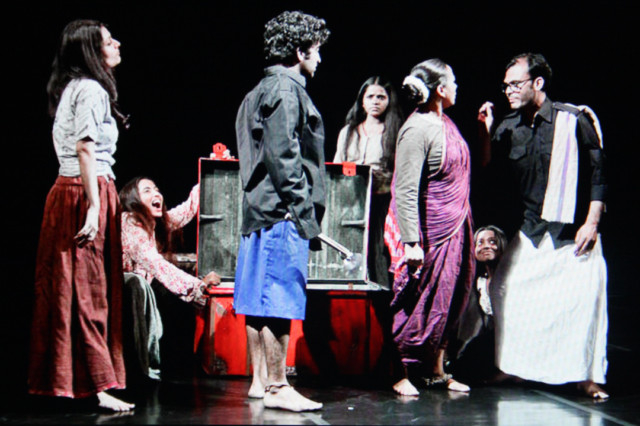
What is the big deal about theatre academics? Can “acting” be actually “learnt”? As far as Hindi films are concerned, most actors who dominated the scene during the 1950s, 1960s and 1970s had not gone to any acting school. Raj Kapoor, Dilip Kumar and Dev Anand are prime examples. But then so are present-time stars including Shah Rukh Khan, Aamir Khan and Salman Khan.
So, where do institutions such as New Delhi-based National School of Drama (NSD) stand?
Ask Manoj Bajpayee, the acting powerhouse of Indian cinema. So important it was for him to join NSD that on being denied admission, he contemplated committing suicide. “I had wanted to be an actor since my school days, but never let the family know of it,” Bajpayee recounted. “I was devastated when NSD rejected me, and saw no purpose in life. Though I finally did get into it and began my journey in professional theatre, even if NSD had rejected me ten times, I would still have been trying to join it and become an actor.”
That students still queue up for admissions at NSD proves that, though the institution has over the years gone through some rough weather, it is still considered one of the foremost theatre-training institutions in the world and the only one of its kind in India.
Set up by the Indian music, dance and drama institution, the Sangeet Natak Akademi (SNA), in 1959 with the aim of reviving India’s cultural glory, NSD was a part of SNA. It became an independent entity in 1975 and was registered as an autonomous body, under the Ministry of Culture, Government of India.
Training at NSD is considered highly intensive and is based on a comprehensive syllabus, which covers every aspect of theatre and in which theory is related to practice. As a part of training, students are required to produce plays, which are then performed before the public. It takes into account the methods of great theatre personalities who have shaped contemporary theatre in all its variety.
The systematic study and practical performing experience of Sanskrit drama, modern Indian drama, traditional Indian theatre forms, Asian drama and western dramatic protocols provide the students a solid grounding and a wide perspective in the art of theatre.
Besides its training programme, NSD has explored new vistas in the field of children’s theatre and decentralisation of theatre training through workshops under the Extension Programme. Its two performing wings — the Repertory Company and Theatre In Education Company — were started in 1964 and 1989, respectively.
The repertory has taken landmark plays of various playwrights and directors who have been associated with it to the far corners of the country. It has built up new awareness, taste and sense of artistic responsibility in the theatre profession. And the education wing has evolved into one of the most important theatre-education resource centres in the country.
But while most artistes who have passed out of NSD are happy with its training aspects, some feel the government should open repertories in the states to employ artistes. These could provide a platform to regional theatre and help sustain traditional art forms all over the country.
As a critic put it, “Over the years, somewhere along the way, NSD seems to be losing its original purpose. It was set up to concentrate on training actors and should have remained just that. But by taking up other responsibilities, including holding festivals and getting into publications, it has strayed from the path.
“Apart from it continuing with an outdated syllabus, which is not in keeping with the times, NSD has failed to enable its students to make a living out of theatre. As a result, left with no choice, many move to films and television.”
Bajpayee too admits there is little money in theatre. “I looked towards films only to be financially comfortable,” he says. Though having established himself, he never forgets to credit NSD for his acting prowess.
Irrfan Khan, also a product of NSD, has always credited the institution for his success as an actor. So have many others such as Om Puri, Naseeruddin Shah, Rohini Hattangadi, Anupam Kher, Manohar Singh, Pankaj Kapur, Zohra Sehgal, Govind Namdev, Manohar Singh, Om Shivpuri, Sai Paranjpe and Kulbhushan Kharbanda.
Govind Namdev, who has risen to become one of India’s stellar performers, is best known for the off-beat characters played on screen. “Whatever I am today is because of theatre,” he says. “From my school days, I had a knack for writing and acting. But it was only after joining NSD that I realised that I wanted to become an actor. I staged plays in Germany, London and many other countries. It gave me recognition and built my confidence.”
Om Puri is another huge fan of NSD, as also of its former director Ebrahim Alkazi. “I am grateful to the NSD because it gave me both — the training and the confidence to confront all odds and equipped me to face and overcome all challenges,” he says. “It was Alkazi saab’s encouragement that made me go eyeball-to-eyeball with Jack Nicholson and Amitabh Bachchan.”
Alkazi, now 87, was a hard taskmaster who made no compromises. After his appointment as director in 1962, NSD became an altogether different experience. In an interview he had said that he “demanded” his students start training at 4 am: “How can you presume to be an actor unless you prepare your mind, body and soul to put yourself into every kind of situation? How can you reveal to audiences truths you don’t understand?”
Pankaj Kapur, who trained under him, says, “Alkazi saab introduced us to the best of art, music, world cinema and the magic of great, powerhouse performances. However, times have changed. New themes, concepts and new-age directors continue to throw up new challenges. Herein, NSD needs to realign itself.”
Anupam Kher, who was appointed NSD’s chairman in 2002, too had expressed disappointment saying the country’s foremost theatre training institute needed to be more energetic. “The NSD has not moved with the times. It is not hungry enough. It needs energy,” he had said.
Probably, that is the reason why some youngsters have of late felt uncomfortable in joining theatre. A student, who has just graduated from NSD, remarks: “While the basics of acting that NSD imparts is fine, it does not fit in the Bollywood scheme of things. Moreover, there’s a need for new realism and purpose to Indian drama, which I find lacking here.”
Incidentally, the post of the director at NSD has been lying vacant for the past few months and the government had formed a committee to find a suitable person to head it. But while there are numerous contenders, there is a lack of unanimity in the choice.
Meanwhile, Alkazi, the only person who remained NSD director for 30 long years, stays away from the imbroglio.
He reminiscences about the times when NSD was set up at a ramshackle rented house in south Delhi’s Kailash Colony. Alkazi got his students to dig and build platforms for a theatre in the backyard. His idea was, “When you create your environment, you feel at home in it.” His students did not have a problem with it, and they played to full houses. Later, the institution got a new home at Bahawalpur House, Bhagwandas Road, in central Delhi.
For Alkazi, theatre was not at all exhausting; instead, it was an exhilarating experience. “My actors have affection, even reverence for me,” he says. “I have shaken them to their depths, given them something they are savouring now, to share with others. But nowhere in the world can you make a living out of theatre alone. That’s why NSD should train actors for television, radio and films. It would be fantastic if they could bring the kind of intensity generated in theatre training to other forums.”
Alkazi was passionate about his work and had an unerring visual sense that made him stand out among other directors. “I developed a visual approach to the theatre, as opposed to just a literary approach,” he says. “I was very concerned with how the stage would look, with the overall design.”
He even criticises his actors: “They tend to get conceited very soon. It is important to know how to keep them balanced.”
Alkazi, who retired from NSD in 1977, was open to challenges. He has directed more than 50 plays, including famous productions of Girish Karnad’s “Tuglak”; Mohan Rakesh’s “Ashadh Ka Ek Din”, based on the life of Kalidas; and Dharamvir Bharati’s “Andha Yug”, set in the aftermath of the “Mahabharata” war.
Under his supervision, while NSD primarily represented Indian theatre, it was also open to traditions from other countries and he directed numerous Shakespeare and Greek plays.
Nilima Pathak is a journalist based in New Delhi.



